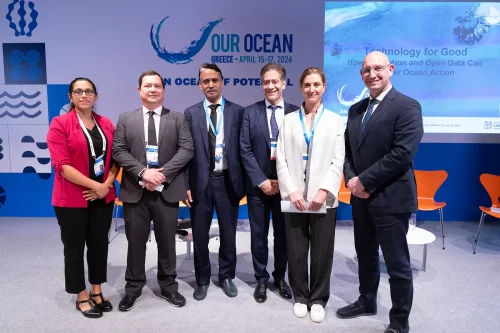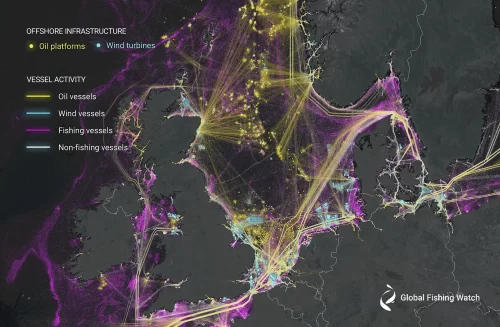The Joint Analytical Cell finds a Chinese-linked squid fleet manipulating vessel identities and locations
The Joint Analytical Cell (JAC) published a new collaborative analysis examining a fleet of Chinese-linked distant-water squid fishing vessels displaying behavior that indicates efforts to hide fishing activity, including possible illegal, unreported and unregulated (IUU) activity. Specific cases were identified by the JAC where this behavior appears to be facilitating the sharing of authorized vessel identities between vessels. This behavior has also been linked to the operations of a group of IUU listed vessels.
In this newly published Fisheries Intelligence Report, the JAC provides a comprehensive analysis of a fleet of vessels reporting on Maritime Mobile Service Identities in the 150 series. The first three numbers of Maritime Mobile Service Identities identify the issuing country. However, Maritime Mobile Service Identities in the 150 series are not assigned to any country and may be used to hide fishing activities and prevent association with a flag State. The vessels identified by the JAC have engaged in regular name changes over the Automatic Identification System, sharing of names and Maritime Mobile Service Identities between vessels and the transmission of multiple Maritime Mobile Service Identities and other spoofing behavior from individual vessels. This behavior alone does not constitute IUU activity, however, it makes it difficult for relevant authorities to monitor individual vessels, confirm their identities and associate with a flag State. This is a matter of concern for regional fisheries management organizations, coastal States and port States that the vessels interact with in the course of their operations.
The JAC shared a copy of the draft report with the China Bureau of Fisheries to alert them of the behaviors identified and to provide them with an opportunity to comment on the findings. As a result of this outreach, the China Overseas Fisheries Association has confirmed that on at least one occasion, a vessel reporting on a 150 series Maritime Mobile Service Identity in the Atlantic / Pacific squid grounds was using the identity of an authorized Chinese fishing vessel that according to the information available to Chinese authorities, was operating in the Indian Ocean. The China Overseas Fisheries Association has advised the JAC that an investigation is underway.
The report concludes with a recommendation that any distant water squid vessel that is currently or has historically transmitted over a Maritime Mobile Service Identity in the 150 series should be considered high risk of engaging in IUU fishing activities. The JAC further recommends appropriate inspection or investigation action be prioritized for these vessels and that authorities focus on confirming the identity of the vessel.
“This work demonstrates the value of the Joint Analytical Cell and the importance of cooperation and collaboration to identify and understand the challenges facing our world’s ocean. The analysis provides useful recommendations that may strengthen national and regional efforts to combat IUU fishing. We welcome the engagement of China and hope this provides a basis for future exchanges and ongoing cooperation,” said Mark Young, executive director of the IMCS Network.
You can find the report here.


